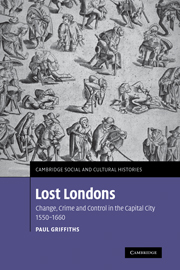Book contents
- Frontmatter
- Contents
- Maps and tables
- Abbreviations
- Preface
- Introduction: Rhetorics and records
- Part I Change
- Part II Crime
- Part III Control
- 6 Court days
- 7 Bodies
- 8 Policing: people and policy
- 9 Policing: night battles
- 10 Policing: process and prosecution
- 11 Policing: knowledge
- Conclusion
- Appendix
- Bibliography
- Index
8 - Policing: people and policy
Published online by Cambridge University Press: 15 December 2009
- Frontmatter
- Contents
- Maps and tables
- Abbreviations
- Preface
- Introduction: Rhetorics and records
- Part I Change
- Part II Crime
- Part III Control
- 6 Court days
- 7 Bodies
- 8 Policing: people and policy
- 9 Policing: night battles
- 10 Policing: process and prosecution
- 11 Policing: knowledge
- Conclusion
- Appendix
- Bibliography
- Index
Summary
Getting rid of Dogberry and Elbow
Thanks largely to Joan Kent's work on policing we ought by now to have got rid of the stereotypes of the dithering clown constables Dogberry and Elbow who traipse through Much Ado About Nothing and Measure for Measure. This was dry caricature, but believable. Comic constables were stock literary characters at the time, and there were enough bumbling officers across the land for them to be instantly recognizable. But we might remember that Dogberry did a good job. He brought a pair of ‘villains’ before Leonato and got money for his ‘care’. Elbow also took a ‘parcel bawd’, ‘hot-house’ patron, and thief into custody. The pair are nowhere near representative of constables, whose performances ranged anywhere from careful to careless, and they should remain as paper caricatures if we always pick out their funny sides, forgetting perhaps that Elbow served in his post for seven-and-a-half years, although steps were being taken to replace him as the play draws to a close.
Yet much previous work sees early modern constables as second-rate amateurs for the most part, neighbours who served by turn for one year only and were not even paid for their troubles. It is often said that a system staffed by part-time amateurs must have had flaws, and left unsaid that to improve it needed to become ‘professional’.
- Type
- Chapter
- Information
- Lost LondonsChange, Crime, and Control in the Capital City, 1550–1660, pp. 291 - 331Publisher: Cambridge University PressPrint publication year: 2008



